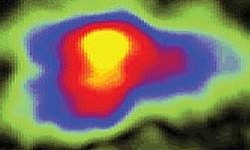Visualizing gas-phase reactions with magnetic resonance imaging (MRI) could significantly improve the design of future microcatalytic reactors, including "labs-on-a-chip," and could also affect catalyst design. Alexander Pines of the Materials Sciences Division at DOE's Lawrence Berkeley National Laboratory led a team that developed enhanced MRI of microscale catalytic reaction products using hyperpolarized parahydrogen gas. MRI is unique for its ability to measure velocity- and spatially-dependent quantities, which the researchers demonstrated by tracking gases and liquids in microfluidic devices, as well as in the void spaces of a tightly packed catalyst reactor bed, without the use of tracer particles or gases.
| Attachment | Size |
|---|---|
| 525.11 KB |

